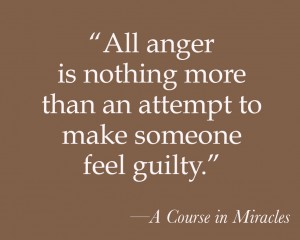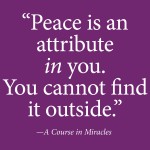 Spirituality sometimes comes across as light and fluffy—the Orange Julius of belief. But this line from A Course in Miracles shows that spiritual teachings require our vigilance.
Spirituality sometimes comes across as light and fluffy—the Orange Julius of belief. But this line from A Course in Miracles shows that spiritual teachings require our vigilance.
“All anger is nothing more than an attempt to make someone feel guilty.”
This one sentence invites us to understand where our thoughts, emotions and reactions come from so we can feel the comfort of our faith by practicing it daily rather than hoping it’ll be there when we need it.
The context of this passage, like everything in A Course in Miracles, is simple but not easy. It comes from the understanding that we all have an ego mind that experiences guilt as a form of fear.
Because feeling our own guilt makes us want to wriggle out of our skin, we project anger onto others to make them feel guilty so we can experience some momentary relief.
I think it’s important to understand this in light of…. everything. The violence that spurs our debate about gun control is an extreme projection of our anger. But we all use anger as a weapon against others and simultaneously, as the Course points out, against ourselves.
Anger is not part of our spiritual nature, but it is part of our human experience.
So what does this mean in how we conduct ourselves day to day? What do you do when a driver cuts you off on the freeway, your child is bullied, your spouse forgets your anniversary…or someone causes serious harm to a person or thing you love? And how do you deal with the chronic anger you might feel over something from childhood or an old hurt that keeps flaring up like a cut that won’t heal?
A Course in Miracles gives us three guidelines for understanding. Anger, it says, cannot occur unless you believe that…
- You have been attacked.
- Your attack is justified in return.
- You are in no way responsible for it.
Let’s take being cut off on the freeway as an example. It’s the perfect example, really, because unless the incident escalates to road rage, you’re never going to actually talk to that other driver or see him again. But you still want to make him feel guilty.
And so you do, in your own mind.
You yell obscenities at the driver for being reckless and getting in your way. Maybe you even envision a Steve McQueen moment in which you chase him down and cut him off just to even the score and teach him a lesson.
In that scenario, which seems completely real even though it’s taking place in your own thoughts, you’re fulfilling the three criteria:
You believe you’ve been attacked. You believe you’re justified in returning that attack. And you believe that you’re not responsible for any of it. After all, it was the other driver who started it.
But here’s the thing. When the Course says we believe we’re in no way responsible, it’s really talking about our thoughts. It’s saying that, in that moment of anger, I believe I’m not responsible for where my mind takes me.
So I let my ego mind run where it wants to, hanging the other person out to dry. The only problem is, because my mind is temporarily insane with my Steve McQueen moment, I’m hanging up there right along with him. The other driver doesn’t even know how angry I am, but I’ve made myself miserable.
It can happen over the tiniest slights and the biggest wounds. The dynamics are always the same.
Now, I have to say, sometimes anger helps you break through. I can think of many times in my life when anger gave me a voice so I could stand up for myself and say “enough” to a situation I’d been tolerating. It has helped me end an unhealthy marriage, start my own business and say no to people who might have taken advantage of me.
We can use anger to remember who we are. But, more often, it makes us forget who we are instead.
So what would happen if we took a Miracles approach?
In this scenario, someone cuts you off on the freeway. You don’t experience it as an attack because you know it has nothing to do with you. That other driver acted out of his own fear-based emotions, and you were there to witness it.
You take responsibility for your own beliefs and reactions, remembering that peace is your Number One goal. In fact, you may even send that other driver blessings and ask for his safety on the road.
This is not about talking yourself out of being angry. It’s not about telling yourself you should handle it better or, in the ego’s ironic way, getting mad at yourself if you get angry.
There’s no pretending in this, no fake it until you make it. This is about intentionally choosing your thoughts to react with peace rather than retaliation. If you’re engaged in your ego mind of fear, you’ll see an attack and lash back. If you’re in your right mind, the mind of peace and sanity, the other person’s behavior will have no effect on you.
“Yeah, right,” your ego may be saying.
Okay, so let’s look at what else you can do, also Course-endorsed.
When your anger flares up, you ask for help from Spirit.
You say something like this:
“I realize I’m not sane right now. My fear-based thoughts have taken over, which doesn’t do me or anyone else any good. Peace is my only goal, and I need your help.”
And then you ask for healing. It’s the simplest thing you can do, and the most effective.
Just remember that your fear-based mind may currently be your default position when stress comes into your life. Remember that this is a poor facsimile of you. And that, really, Steve McQueen is probably not your role model for life. And mostly, remember who you are. Know that, as an extension of Love, you can ask for help at any moment and receive it.
Sometimes you’ll be able to toggle your thoughts to your right mind. Sometimes you won’t. That’s why all roads lead back to a conversation with the Divine.
Remember. Ask. Be vigilant. You deserve peace rather than anger, along with all the help Spirit is here to give you.
Next in the series: “It has been hopeless to attempt to find the hope of peace upon a battleground.”












